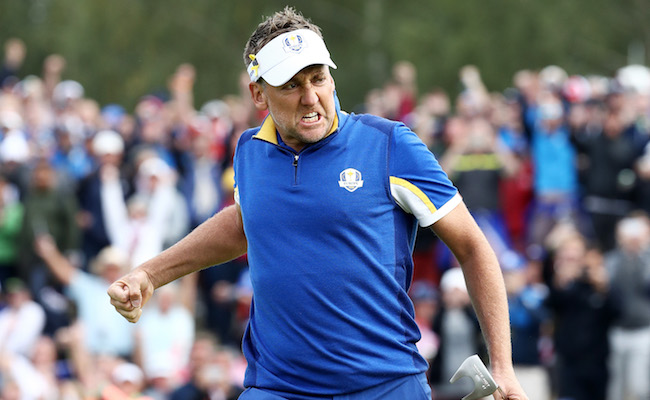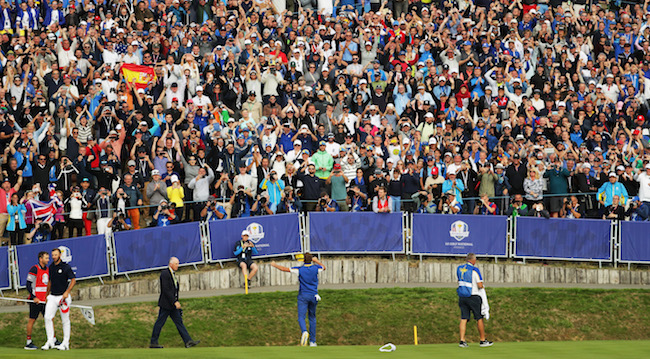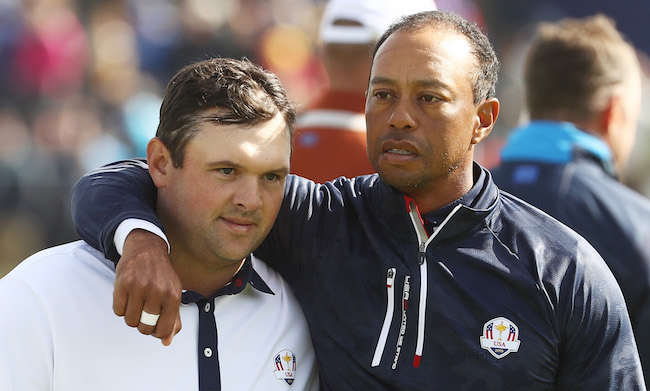
In the dead of night, things were happening.
The 2018 Ryder Cup took place at Le Golf National in Paris, meaning that fans in the United States faced interesting circumstances to consume the festivities. With the first tee time of the three-day event set for 2:10 am ET on Friday “morning,” it might be difficult to picture much of a desire to view live golf in America but, well, the Ryder Cup is different.
While most sports fans may seek out a trip to Las Vegas with an eye toward the Super Bowl, a prestigious fight or March Madness, a late September journey centered on the Ryder Cup for at least one person. With travel challenges including a maddening delay on the tarmac, a Delta flight arrived in the desert on Thursday evening and with only 45 minutes until the first tee shot of an event that actually begins on Friday.
Undeterred, a plan was in place to observe the scene (beginning at 11:10 pm local time on Thursday) and moves were executed to transport from McCarran Airport to South Point, the one sportsbook in Vegas that has (and advertises) 24-hour access. Everything went according to plan until, in short, the Golf Channel broadcast was nowhere to be found on any of the dozens (no exaggeration here) of screens available.
On the surface, this wasn’t an overall shock, especially given the time parameters in place. Most live sports aren’t taking place in the dead of the Las Vegas night and, beyond that, golf isn’t exactly the perfect sportsbook entity in a traditional sense. Still, there were a few die-hards in the same predicament, voicing joint displeasure in the challenge ahead.
Mercifully (and after some greased palms), viewing was secured after returning to the Strip and the question of “can we pull this off?” emanated. Most sports journalism is inherently supposed to be unbiased, but, to put it plainly, that will never be the case for this particular event. The history is too rich, the lines are firmly drawn and, even if patriotism can be a complex topic through the prism of sports, it is also a real thing when it comes to the Ryder Cup.

As someone that grew up without the monetary resources to play golf on a regular basis, most of my history with the sport stemmed from the joy and intrigue of watching others. Early memories center on my father’s love for Fred Couples, Tom Kite grinding through the field at Pebble Beach to win the U.S. Open in 1992, Ben Crenshaw (another fatherly favorite) turning back time to win at Augusta in 1995 and many others. Then, Tiger Woods arrived with fury at Augusta, just two hours from my childhood home, in 1997 and any notion of golf fandom fading to the background evaporated.
From a Ryder Cup perspective, it was the 1999 event that sealed the deal. Justin Leonard buried a now-legendary putt to snatch the cup for the United States and, when the celebration occurred, even an early teenage version of myself understand that everything was different.
Golfers are allowed to do that? They’re allowed to just go crazy and cheer and fist pump? That’s a thing?
The next several meetings didn’t end well for the United States, with Europe claiming four out of five victories from 2002 through 2010. That, of course, didn’t sit well locally but the 2012 event was supposed to be different at Medinah Country Club. In what was actually a bizarre coincidence at that particular time, a (much) younger version of myself was actually in Las Vegas for the 2012 edition, diligently following the proceedings in the midst of other shenanigans as the United States took a massive, seemingly unsurmountable lead into Saturday.
Originally, the plan was to return on Saturday evening with a red-eye flight in plenty of time to land, transport, and dig in for what should have been a celebratory effort on Sunday. The first punch in the gut arrived with the realization that flight plans were miscalculated and, out of a four-member party that made its way to Sin City for the weekend, only one individual remained in Las Vegas for an additional 24 hours.
Still, it was easy to talk myself into hanging around Las Vegas for another day, with a full slate of NFL football on the horizon and, most importantly, the chance to watch the United States raise the cup. Disaster struck, however, and the feeling of utter devastation reigned as the European squad poured in putt after putt as the hometown team scuffled throughout the day and gave up what still remains a stunning destruction on the way to a fabled comeback.
The 2012 edition will forever be etched in my golf-driven mind, particularly given the bizarre circumstances and the sinking feeling (at least by the middle of the day) that the collapse was really going to happen. There was a helpless tone to everything that transpired and, by the time Europe accumulated the requisite 14.5 points needed to finish the job, the trip to the airport and, by extension, home occurred in the equivalent of a blind trance.

As with many recent events, the 2018 edition favored the United States, at least on paper, even with the realization that the team hasn’t won a Cup on European soil since 1993. The Americans entered as sizable betting favorites in the market and, top to bottom, it would be reasonable to argue that captain Jim Furyk had an impossibly strong collection of talent.
As a result, individual expectations were off the charts and the first set of four matches on Friday morning (or Thursday evening, in the case of the desert) did nothing to remove that. The United States fired out of the gate, claiming three points to just one for Europe, and the favored squad appeared to be in complete and utter control as the afternoon session neared. If anything, the Americans should have swept the board, with the tandem of Tiger Woods and Patrick Reed letting a two-hole lead slip away with seven holes to go on the way to an unexpected loss.
In the moment, that did not feel in any way devastating or even discouraging but, in retrospect, it may have been a sign of things to come. On cue, Europe did what Europe often does in this event, especially in their own backyard, and the United States floundered, getting swept in all four matches during the second session.
With the tally sitting at 5-3 entering Saturday, the “favored” status flipped and, unfortunately for the road team, the ball kept rolling. Europe accumulated eight consecutive match victories overall, setting a new mark for the longest streak of wins since the event’s format changed in 1979, and not even a bounce-back later on day two could remove the host continent from its comfort zone.
There were positive moments on Saturday for the Americans, ranging from an Alex Noren blow-up that allowed Webb Simpson to halve a hole with a triple bogey, to a couple of (much) needed victories in the later session from the duos Bubba Watson and Simpson, and Justin Thomas and Jordan Spieth. Still, the full-fledged comeback didn’t get out of the blocks and, as Sunday morning arrived, the United States would be forced to overcome a 10-6 deficit.
With this event, the rational can become irrational in a hurry and momentum is, in short, everything. With that as the backdrop, it was hard to ignore that the same 10-6 deficit was flipped as Sunday began back in 2012 and, considering the venue in which I viewed the festivities, the possibility of synergy was evident.
If simply glancing at a running scoreboard in retrospect, it may seem as if the United States did, in fact, threaten to pull off the near-impossible task of overcoming a four-point deficit. Thomas defeated Rory McIlroy in the day’s first match and Webb Simpson pulled off an upset over Justin Rose shortly thereafter. Sandwiched between was a half-point secured from Brooks Koepka and, by the running tick-tock of the technical scoring, the United States closed within two points after just three matches.
The reality, though, was that the comeback never fully materialized. There were moments worthy of full-blown fist pumps from the likes of Woods and Dustin Johnson, coupled with fans and journalists scribbling scenarios on the back of napkins to allow for the Americans to pull off the miracle. The Europeans were having none of it, however, as the slow parade of clutch putts, steady play and passionate defense of the lead trickled down to what became a blowout victory.
Unofficially, the event came to a close when, almost simultaneously, Francesco Molinari and Sergio Garcia clinched half-points that made the math impossible for the United States. Then, in unfathomably on-brand fashion, Phil Mickelson’s tee shot on the Par 3 16th hole landed in the water and, soberly, the veteran left-hander turned to Molinari, conceding the hole on the tee box and, by extension, both the match and the cup to the Europeans.
Vive le bleus! 🔵#TeamEurope are Bjorn again!
The #RyderCup is theirs for the next two years! 🏆
Follow live coverage from the Sunday singles at the 42nd #RyderCup and watch on Sky Sports' Ryder Cup channel: https://t.co/wrurjdHdi5 #BelieveInBlue pic.twitter.com/ozyl5cr5wf
— Sky Sports Golf (@SkySportsGolf) September 30, 2018
#TEAMEUROPE HAVE WON THE RYDER CUP BACK!!!!! pic.twitter.com/7Pgo7CrxFp
— Ryder Cup Europe (@RyderCupEurope) September 30, 2018
Celebration predictably ensued and, moments later, the final image of the on-course action was another perfectly fitting event. Noren, playing in the final match opposed by Bryson DeChambeau, converted a (very) long putt to win a full point with DeChambeau tucked in tight for birdie, allowing for yet another independent celebration on the 18th green and a sheepish shrug from his opponent.
The perfect way to finish!!!#TeamEurope #RyderCup pic.twitter.com/8hn4hC8Qf6
— Ryder Cup Europe (@RyderCupEurope) September 30, 2018
While American fans certainly did not enjoy what transpired, the eruptions (and subsequent comments from team members) on the European side served as a reminder that both sides really want to claim victory. If anything, the narrative continues that Europe “wants it more” and, while that is potentially true, the brutal nature of the defeat won’t sit well in the United States, both from players/captains and fans.
As with many sporting events, especially outside of golf, there is plenty of time for second-guessing and much of that centers on the work of U.S. captain Jim Furyk. In the end, the ultimate margin was sizable enough to discourage overarching sentiment that Furyk “cost” his team any real chance at victory, but pairings were criticized throughout the weekend (particularly in the selection of afternoon foursomes) and his “captain’s picks” did not prove overly fruitful.
The duo of Woods and Mickelson finished a thoroughly disappointing 0-6-0 on the weekend and, even if the selection of Woods was a particular no-brainer, that was a significant setback to the Americans. While die-hards will undoubtedly comb through the proceedings in search of more concrete answers, the simple reality that Europe performed as the superior team from wire to wire should permeate any discussion, even if that is a difficult notion to come to grips with for some.
Meanwhile, the Las Vegas setting remains less than forgiving, at least in a two-event sample for one patron. The 2012 collapse was a particular brand of brutality, as the blindsiding nature of the defeat overshadowed everything. The 2018 edition, however, was one marked with optimism in the early going, worry and dread in the middle, and resignation to the inevitable on Sunday.
At some point in the next 25 years, the United States will almost certainly win a Ryder Cup across the pond but, once again in 2018, the favorites came up short and most in Sin City likely let the result slip by them with a shrug or only mild disappointment. For the few tucked away in sportsbooks from 11 pm local time into the wee hours and, eventually, to the following morning in sportsbooks across the city, though, the pain was real and there wasn’t enough coffee in the world to drown the sting of exhaustion and sports-driven anguish.






